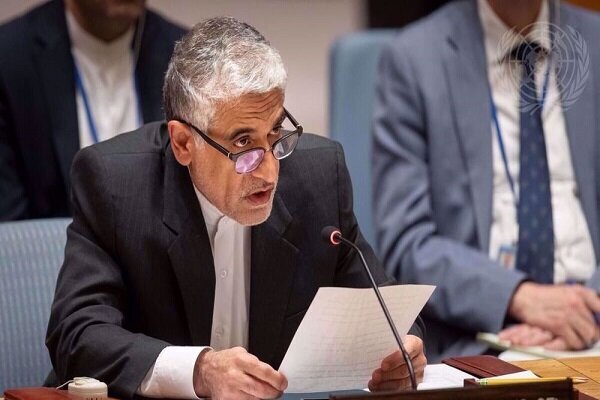Addressing the UN Security Council briefing on “Situation in Afghanistan”, Iravani emphasized the fundamental lack of a humanitarian response plan for Afghanistan and called for impartial humanitarian aid and the removal of unilateral sanctions to help Afghanistan's economic recovery.
"Iran emphasizes the moral obligation of the international community to support Afghanistan and calls for collective efforts to reconstruct the Afghan economy and facilitate the safe return of refugees.
The full text of Iravani's speech is as follows:
I thank Albania for convening this meeting. I also thank Ms. Otunbayeva, Special Representative, and Ms. Sima Bahous, Executive Director (UN Women), for their briefing.
We also take note of the Secretary-General’s report on the situation in Afghanistan (S/2023/678).
The report highlights the ongoing and escalating humanitarian crisis in Afghanistan in 2023. It reveals that an alarming two-thirds of the population, approximately 29.2 million people, require urgent assistance, marking a concerning increase from 28.3 million earlier in the year.
Adding to the severity of the situation, inadequate humanitarian funding has exacerbated these unprecedented levels of need. The Humanitarian Response Plan, requiring a total of 3.23 billion dollars, remains severely underfunded, with only 27 percent of the necessary funds secured as of September 12th.
We firmly believe in the importance of impartial and unconditional humanitarian aid. It is also crucial to lift unilateral sanctions to support and facilitate Afghanistan's economic recovery.
The international community has a moral obligation to fulfill its humanitarian commitments and pledges, demonstrating solidarity and compassion for the Afghan people.
We emphasize the need for collective cooperation to assist Afghanistan in rebuilding its economy and creating conditions conducive to the well-being of its citizens, while also facilitating the safe return of Afghan refugees.
As a neighboring country, deeply impacted by the influx of millions of Afghan refugees, we are alarmed by the potential consequences of the current situation for regional security and stability. The persistent presence of Daesh and Al-Qaida affiliates, coupled with the scourge of drug trafficking, poses a substantial threat to Afghanistan, neighboring countries, and the broader international community.
Tragically, on 13 August 2023, we witnessed yet another devastating terrorist attack, targeting innocent civilians and pilgrims visiting the Shah-e-Cheragh shrine in Shiraz. This cowardly act resulted in the martyrdom of two innocent Iranians and the injury of several others. Daesh claimed responsibility for the second such attack in ten months.
While preliminary indications suggest a reduction in opium poppy cultivation in Afghanistan, following a de facto authorities ban on narcotics cultivation in April 2022, our concerns regarding drug trafficking persist.
Regrettably, there has been no progress by the de facto authorities in achieving genuine ethnic and political inclusion. Instead, they continue to impose increasingly stringent restrictions on Afghan women and girls, severely curtailing their access to education. We reiterate our call for the establishment of an inclusive government, recognizing it as a crucial step towards the safety and dignified return of millions of Afghan refugees to their homeland.
We are also deeply concerned about measures taken by the de-facto authorities that seek to undermine Afghans' cultural, linguistic, and historical ties to the Farsi language. These measures not only threaten Afghanistan's stability and security but also violate the basic human rights of all Afghan citizens. They should be promptly reversed to protect the rights of the Afghan people.
Iran remains steadfast in its commitment to close collaboration with neighboring countries, relevant partners, and the United Nations to promote enduring peace, security, and stability in Afghanistan.
Iran played a crucial role in the delivery of humanitarian aid to Afghanistan by establishing a novel distribution route that utilized the Chabahar port in Iran. As an example, on July 4th, a substantial shipment of 10,000 metric tons of wheat successfully reached Herat for further distribution to people in need across Afghanistan.
Despite the Taliban's failure to meet their commitments, we must maintain our constructive engagement with the de facto authorities. This approach is instrumental in seeking the best possible outcomes for the people of Afghanistan and the broader international community.
Iran believes that collaboration between Afghanistan and regional countries will resolve the challenges the Country is facing. To this end, Iran actively supports regional initiatives aimed at fostering dialogue with Afghanistan, such as neighboring ministerial meetings and the Moscow format, the next round of which is scheduled for September 29th in Kazan, Russia. We look forward to the outcome of this meeting, which will focus on the key subject of inclusive government.
We hope that the de facto authorities will fulfill their international obligations, particularly in upholding Afghanistan's commitments under border treaties with its neighbors.
Finally, we reaffirm our support for the ongoing United Nations efforts, particularly UNAMA, which play a pivotal role in the pursuit of peace and stability in Afghanistan, a matter of paramount importance given the current circumstances.
MNA/IRN85240032

























Your Comment